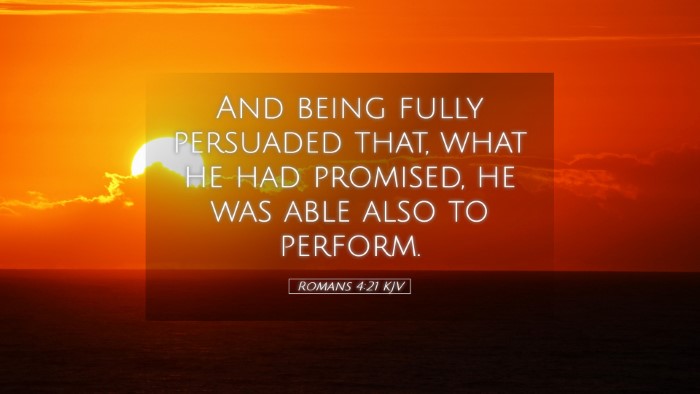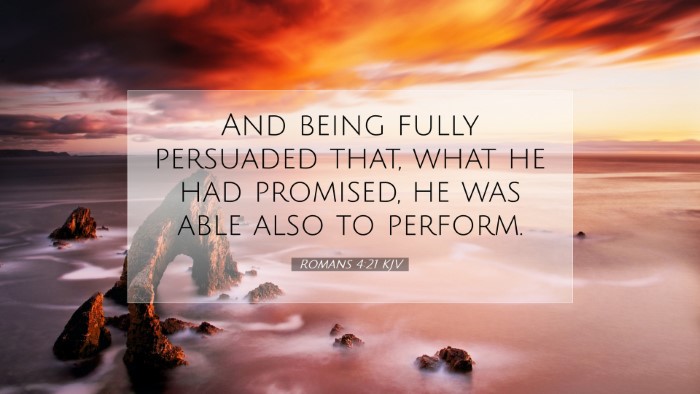Old Testament
Genesis Exodus Leviticus Numbers Deuteronomy Joshua Judges Ruth 1 Samuel 2 Samuel 1 Kings 2 Kings 1 Chronicles 2 Chronicles Ezra Nehemiah Esther Job Psalms Proverbs Ecclesiastes Song of Solomon Isaiah Jeremiah Lamentations Ezekiel Daniel Hosea Joel Amos Obadiah Jonah Micah Nahum Habakkuk Zephaniah Haggai Zechariah MalachiRomans 4:21
Romans 4:21 KJV
And being fully persuaded that, what he had promised, he was able also to perform.
Romans 4:21 Bible Commentary
Romans 4:21 - “And being fully persuaded that, what he had promised, he was able also to perform.”
Introduction
The verse from Romans 4:21 highlights a fundamental tenet of Christian faith: God’s faithfulness in fulfilling His promises. This profound assurance encapsulated in this verse is significant for believers as they navigate through challenges and uncertainties in life. The commentaries from Matthew Henry, Albert Barnes, and Adam Clarke provide rich insights into the meaning and implications of this verse.
Matthew Henry’s Commentary
Matthew Henry emphasizes the unwavering belief that Abraham held regarding God’s promises. He explores the historical context, noting how Abraham's faith was not merely hopeful thinking but was grounded in the character of God Himself. Henry states:
"Abraham was fully assured, not only of the truth of the promise, but of the power of the promiser."
- The Nature of Faith: Henry elaborates on the nature of true faith as being an assurance that transcends human capacity and reasoning. Abraham’s faith was not passive; it actively engaged with the certainty of God’s ability to fulfill what He promised.
- Divine Capability: The phrase “able also to perform” speaks of God’s omnipotence. Henry asserts that the power of God is not limited by human circumstance, encouraging believers to trust without reservation.
Albert Barnes’ Exposition
Albert Barnes presents a more analytical approach to understanding Romans 4:21. He focuses on the source of Abraham's persuasion, which comes from God's integrity. Barnes writes:
"Abraham was fully persuaded that God could do what He promised, which springs from an understanding of God’s faithfulness."
- Theological Implication: Barnes explains that genuine belief in God’s promises can lead to righteousness, inspired by Abraham’s faith. This illustrates the concept of justification by faith, pivotal to Paul’s letter.
- Challenges to Belief: He points out that doubts may arise, especially in seemingly impossible situations, yet highlights that such moments test and ultimately strengthen faith.
Adam Clarke’s Commentary
Adam Clarke’s insight leans into the interpretative nuances of persuasion within biblical faith. Clarke suggests:
"Being fully persuaded signifies not only a confidence in the promise but also a profound spiritual understanding that transcends normal reasoning."
- The Transformative Power of Faith: Clarke notes that such faith can transform the believer, enabling them to see beyond current plight into the realm of divine possibility.
- Personal Application: He encourages readers to emulate Abraham's example in their own faith journeys, urging them to seek a deeper discernment of God’s character to bolster their convictions.
Theological Reflections
This verse serves as a cornerstone in understanding the relationship between human faith and divine capability. It invites deeper theological reflection on several fronts:
- The Nature of God’s Promises: God’s promises are steadfast; believers are assured not just of the promise's truth but also of the power behind it. This reassurance is crucial for maintaining faith in the face of adversity.
- Faith as Assurance: This verse lays the groundwork for understanding faith as a profound assurance that God will fulfill His promises. It invites believers to be ‘fully persuaded’ in their convictions regardless of external pressures or circumstances.
- Application for the Community of Faith: The community of believers can draw encouragement from this verse, promoting a culture of hope and faith amidst trials and tribulations.
Conclusion
Romans 4:21 encapsulates a pivotal truth about the nature of faith in God. As Henry, Barnes, and Clarke have elucidated, true faith is a full persuasion of God’s ability to fulfill His promises. It encourages believers to align their trust not just in the promise itself but in the infinite power and faithfulness of God. In an age where doubt can overshadow hope, this passage remains a beacon of assurance that resonates deeply within the hearts of pastors, students, theologians, and all followers of Christ.


